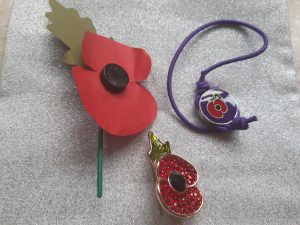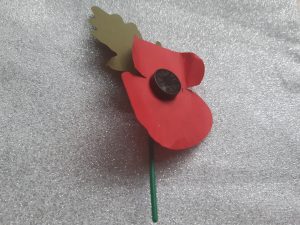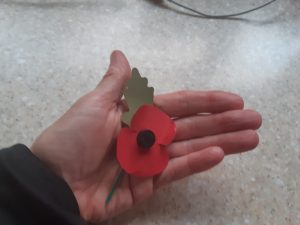Link to Act of Remembrance for Wincanton https://youtu.be/u_78X2vPfxE
Link to the Service for Remembrance for Wincanton https://youtu.be/bGtOub4Bl_M
Matthew 5:1-12, John 14:27
In the name of the living God, Father, Son and Holy Spirit. Amen.
Poppies – We wear poppies for Remembrance. Alongside these simple paper  and plastic poppies – are newer products like wristbands, and glittery poppy brooches, or poppies for cars and lorries. This year in our strange COVID times we have been encouraged to print, colour and display poppies in our windows by the British legion (or to make poppies from plastic bottles/paper plates to display).
and plastic poppies – are newer products like wristbands, and glittery poppy brooches, or poppies for cars and lorries. This year in our strange COVID times we have been encouraged to print, colour and display poppies in our windows by the British legion (or to make poppies from plastic bottles/paper plates to display).
As I am sure you know – The poppy was chosen as the symbol for Remembrance because of what happened in the battle scarred lands where World War One took place. When the battles moved on and the land stopped being used – that soil that had formed the trenches contained thousands of poppy seeds, all lying dormant. They would have lain there for years more, but the battles being fought there churned up the soil so much that when the conflict stopped in an area the poppies bloomed like never before.
One of the most famous bloom of poppies was around Ypres, a town in Flanders, Belgium. This was crucial to the Allied defence. There were three battles there, but it was the second, which was calamitous to the allies since it heralded the first use of chlorine gas in the conflict. This brought forth the poppies in greatest abundance. Even from the deepest of calamities, new life can and did grow in the poppies. The poppies inspired the Canadian soldier, Lieutenant Colonel John McCrae, to write his most famous poem in 1915 after seeing poppies growing in battle scarred fields..
In Flanders Fields
In Flanders fields the poppies blow
Between the crosses, row on row
That mark our place; and in the sky
The larks, still bravely singing, fly
Scarce heard amid the guns below.
We are the Dead. Short days ago
We lived, felt dawn, saw sunset glow,
Loved and were loved, and now we lie
In Flanders fields.
Take up our quarrel with the foe:
To you from failing hands we throw
The torch; be yours to hold it high.
If ye break faith with us who die
We shall not sleep, though poppies grow
In Flanders fields.
John McCrae (1872 – 1918)
An American woman Moina Michael from Georgia, was the first person to wear a poppy in remembrance. In reply to McCrae’s poem, she wrote a poem entitled ‘We shall keep the faith’ which includes the lines:
And now the Torch and Poppy Red – We wear in honor of our dead.
She bought some poppies, wore one, and sold the others, raising money for ex-servicemen. Her colleague, French YMCA Secretary Madame Guerin, took up the idea and made artificial poppies for war orphans. It caught on. In November 1921, the British Legion sold them for the first time some 99 years ago
Remembrance is important – We have been handing the baton of remembrance using poppies from one generation to the next since then. Remembrance is about walking in the footsteps and through the stories of those who have gone before us. Standing shoulder to shoulder with them and living learning from their experience. It is important to keep passing the poppy baton on to our children and our children’s children. As we look at our poppies – lets explore the different facets of remembrance.
 Think first about the black centre – a bit like a big full stop. Each full stop in each poppy marks a life lost, lost in conflict in service of their country. Private William Deane is the youngest of the fallen from Wincanton in the first world war. Just 18 years old – a young life coming to an abrupt full stop – and we could feel strongly that it was a young life that had hardly started. From Tony Goddard’s “More than just names” – Both William’s parents died when he was young, so he and his brother Charles were brought up by his Auntie Mabel living in South Street. William lied about his age and joined up at just 17 in Yeovil in 1915. He died in Roeux Wood near Arras on 3rd May 1917 just 10 months after arriving in France.
Think first about the black centre – a bit like a big full stop. Each full stop in each poppy marks a life lost, lost in conflict in service of their country. Private William Deane is the youngest of the fallen from Wincanton in the first world war. Just 18 years old – a young life coming to an abrupt full stop – and we could feel strongly that it was a young life that had hardly started. From Tony Goddard’s “More than just names” – Both William’s parents died when he was young, so he and his brother Charles were brought up by his Auntie Mabel living in South Street. William lied about his age and joined up at just 17 in Yeovil in 1915. He died in Roeux Wood near Arras on 3rd May 1917 just 10 months after arriving in France.
More recently between 2008 and 2014, I lived and ministered in villages close to now Royal Wootton Bassett in the days of the many repatriations. This brought home to me in a new way the cost to many families today of conflict. Parents and grandparents who had lost children, children who had lost a much loved parent. Friends and families now living on treasuring the memories of someone so dear. Let’s also use the full stop centre of our poppies to help us also to remember those who died in more recent conflicts and those living with that loss and grief today.
Let’s next think about the redness of the poppy’s petals. The redness reminds us of danger and harm. In our mind’s eye let’s remember those still involved in conflict today. The petals as a visual reminder of the blood spilt. Injuries sustained in and through conflict change the lives of those impacted for ever. Thinking back – we remember particularly the impact on the whole person of shell shock and post-traumatic stress disorder. Things after the first and second world war that the society of the day did not understand in the way we do today. Things that caused hurt and stress in family and community life. And in our present – Help us also to remember too those who have been injured in more recent conflicts and those living with significant challenges and disabilities today, and those who support them.
Next we turn to the stalk of the poppy – reflecting on it as the peace in which we stand. Peace won for us by the actions of those who have gone before us, those known to us and those we never knew. Help us to learn from the past and do all that we can to make the world a better place to live in for the future. To always have hearts seeking reconciliation and peace. In the sermon on the mount Jesus said Blessed are the peacemakers for they shall be called children of God. Let’s resolve afresh today to live as peace makers and peace bringers to those around us. In our difficult covid days let us lean into the peace of God that passes all understanding. Peace that Jesus spoke of and peace Jesus has left with us through the power of the Holy Spirit.
Finally, if your poppy has a leaf, let’s use that to signify our walk together and our growth together as a community in this place – loving our neighbours and caring for those who are most vulnerable. Remembrance reminds us of the sacrifice and the selfless example of our forebears. Help us to learn from this the need above all to work together for the common good as they did.
As I conclude these thoughts with a prayer – We may wish to put our hand over or around any poppy we are wearing as we pray – Let us pray
God of life, from generation to generation you have held all creation in the  palm of your hand. As we cradle our Remembrance poppies: hold us close to your heart this day as we remember those who died in conflict, particularly those who lived before us in this place.
palm of your hand. As we cradle our Remembrance poppies: hold us close to your heart this day as we remember those who died in conflict, particularly those who lived before us in this place.
God of life, as we cradle our Remembrance poppies: may the persistence of your healing love continue its work in the lives of individuals and communities still living in the aftermath of conflict particularly our veterans, and all those who have lost loved ones or those living with the impact of life-changing injury. Surround and protect them with your life-giving Spirit.
God of life, as we cradle our Remembrance poppies – Grant us the strength to always work together for peace and for the common good. In the name of Jesus Christ. Amen.
References
https://www.britishlegion.org.uk/get-involved/remembrance/about-remembrance/in-flanders-field
More than just names – the Wincanton Roll of Honour for the Great War by Tony Goddard
The New Revised Standard Version (Anglicized Edition), copyright 1989, 1995
Prayer adapted from Rootsontheweb.com
